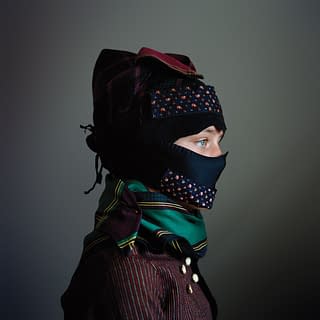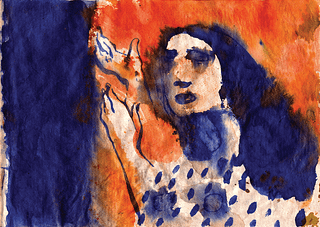
It was just at the start of 2020 that I met for coffee with my Swedish translator, Helena Fagertun, who was visiting New York at the time. I seldom ventured out alone socially, still hadn’t figured out how to be separated from my three-year-old daughter for long periods, but I agreed to meet Helena because she had agreed to come near me. This was often my constraint for “meeting for coffee”: it had to be either in my neighborhood or a neighborhood nearby. I was curious what it would be like to have a conversation with someone who had spent so much time with books I had written. I hadn’t spent much time with either of these books since I wrote them, more than a decade before. Helena had rewritten them in her own language much more recently, so really, in some ways, I’m realizing while writing this, she was more recently the author of these books than I was. Perhaps I was curious to talk to someone who had spent so much time with books that I used to reside within and did no longer. If I’m being honest, I also wanted to meet with her because I wanted her to translate more of my books, especially the novel that was set to be published later that spring, which featured a scene in which the narrator, who might or might not be me, muses about the experience of having books published in Swedish, and then being written about in the Swedish media, the bubbling sense that the press is writing about someone else. In that novel I, or the I that is the narrator, am pregnant with my, or her, first child, and here I was, at the time of my meeting for coffee with Helena, in the fog of an early second pregnancy, which I was still trying to conceal, for various reasons, but which made any exoduses outside the apartment, into the freezing surprise of the open air, or the stale smells of noisy interiors, almost unbearable. Although I’ve become accustomed to playing the loquacious guide in most social interactions, at least with other writers, perhaps now always the professor, I found myself, at least in the one version of my memory that I recall now, without many words, almost absent of speech. When I first became a published writer, more than a decade ago, I was taken aback by how charismatic writers were supposed to be in public, when in my experience the state of being a writer is allowing long periods of being without words, whether through struggle or as a respite, it depends. I have found that I am capable of being chatty, but that I will need to repair within myself afterward, if at all possible, which is increasingly more difficult with two small children and not many places to escape to. The adjunct professor and the published writer, both of which I am, have much in common, I’m realizing as I write this. They are always expected to perform something like brilliance—as well as warmth and charm—in order to be allowed to continue, to continue being hired to teach, and continue being published, both without ongoing contracts. In a way, I wonder how much my personality has evolved by being constantly in a service role, and now I’m also a mother, a steward to others’ needs and feelings. Perhaps this is also how a translator feels, that she is in service to the text, that this is a role partially of self-abnegation, however potentially pleasurable, but not without its alienation. Perhaps a Swedish translator might feel differently from an American writer, within our different economies? None of this I asked Helena Fagertun, or at least not exactly, but I thought about it during our coffee, also wondering how much she got paid to translate one of my words, versus how much I got paid to write one, but then, of course, I got paid again, usually a modest but welcome amount, to have someone else rewrite my words in another language. Perhaps this city has ruined me to art, all I think about is money and how I can get more of it.
When meeting with Helena, I knew I needed to play the part of the author of the books she had translated, and I wonder whether my presence was disappointing for her, or whether I seemed enough like myself, or the version of myself that she expected. Again, I don’t remember. I’ve found in the past two years all memories have become somewhat disoriented. If I’m trying to remember being out in the world before the world changed, especially just before the world changed, I often try to remember where my daughter was at the time, where she was located in the margins of my consciousness. No doubt Helena Fagertun in her own recollection would have a different read on our meeting. It was, I believe, entirely pleasant, and I had no knowledge that this would be one of my last encounters with someone new for some time. I ordered a cappuccino, though I could hardly tolerate it. I remember Helena as self-contained and fairly quiet, but that could have been the language difference, if there was a language difference, or perhaps she was also jet-lagged. I remember asking her more questions than she asked of me, but that felt only fair, she after all knew a lot about me, or at least had access to the interiority in my books, and I knew nothing about her, except that she had translated two of my books and that she lived in Sweden, although I didn’t even ask her where, I assumed Stockholm, which I had visited, a decade ago, back when I traveled. I vaguely remember my three-year-old running in with her father and saying, as if coached, “Hi, Helena.” I remember feeling confused at Helena’s apparent surprise that I had a small child, and sensed perhaps—and I’m most likely projecting—that this dislocated her sense of who I was. Since the works she had translated were written a decade earlier, drawing on material from years prior to that, perhaps Helena was surprised I was older than she had anticipated. My daughter would have known the name Helena, as this was the name of the sixteen-year-old daughter of the family next door, who during her year and a half at home regularly practiced extremely loudly in her punk band, playing mostly Hole covers, thus reliving her parents’ youth, which was also my own, I hope with some knowing irony, although it was hard to tell, a constant negotiation not to wake up our daughter, whose room was closest to the noise, at first over text with Helena and later with her parents, including her father, a tech lawyer who wrote to us, without any irony, “They are just trying to exist and make art under capitalism.” Things have settled between us, though, and Helena now ends before our children’s bedtime, and I listen to the vibrations of the walls with some tenderness. I don’t remember telling this other Helena, my Swedish translator, that I was pregnant, although I might have, it’s possible I felt comfortable confessing something to her I had not shared with many others, mostly out of superstition because of my age, which increased the risk of something going wrong, or so I was warned by others, namely that horde of others, the internet. I had turned forty-two weeks earlier. If I did say something, I wasn’t aware that it had any effect on her, she possibly found this confession inappropriate, as we were complete strangers, but that wasn’t true either, we weren’t quite strangers to each other, but I wasn’t quite sure what the relationship was. There was an intimacy there, however unbalanced. I probably felt I could be candid with Helena because it felt inevitable that she would be reading about it anyway, especially as I so often did draw from my daily life, especially in the recent books. I remember she told me of the trip she was to take to Montana, a pilgrimage to the landscape of another author she was translating. An American had told her that when she was out West, she must look up, because so much of the vista was about the openness, the unbroken sky. I loved hearing about that. Later, when she wrote me an email, she attached a series of photographs dominated by a saturated blue sky, with floating wisps of clouds, the foreground a carpet of snow that looked almost like sand, in the distance rolling hills. All I could focus on, it’s true, was the openness of the sky, how it filled the frame. During my first pregnancy, which I wrote about in the novel Helena hadn’t yet read when we met for coffee, I often felt claustrophobic in my body and in the enclosed spaces of temporary offices where I was teaching, on train cars when I was commuting, in my own apartment where I was attempting to exist, and I would dream of vistas such as these, the openness of such space, almost like the promise of a blank page. The only time I had been in such vastness was on a trip to Scandinavia a decade earlier, the last time I had really traveled out of the country. Perhaps Helena was more used to the vastness than I was. But how would she know about my own specific fantasies of being out West, that I would dream about landscapes like that, she hadn’t yet read the novel, which I hoped she would want to translate. The stretch of space was what I still dreamed about, living in this city, as well as being allowed a stretch of time, having young children and just, yes, trying to exist and make art under capitalism. In my second pregnancy I stopped dreaming of vastness, most likely because it became impossible. We spoke, Helena and I, about landscape and sky, and also Nathalie Léger’s journey to the United States to repeat the pilgrimage of Barbara Loden’s character Wanda in her film of the same name. At our coffee I encouraged Helena to write her own book about this author, to keep a notebook about the process of translating her, a journal of the Western landscape, but now I wonder at my arrogance or, if not arrogance, unknowingness. There is a mystery to translation, to entering a work deeply, knowing it, perhaps more than the original writer. It isn’t actually my voice that the Swedish readers read, it is Helena’s, or Helena somehow channeling mine, some alchemy of the two of us together, residing on the page. How does she do this? What magic happens in this process? The rewriting that is translating is a writing that is closer to reading, which is closer to the writing I wish to do. The translating self is an invisible visitor within the text. It was arrogant to assume that Helena wished for the self in this transformation to be made more visible. This was the individualistic, capitalist approach to literature I have been of late trying to rid myself of, and why I was actively seeking out forms of collaboration and community. It was a brief meeting with Helena, no longer than an hour. I haven’t returned to the bookstore where we had coffee since then, though it used to be a place I frequented. Nor, I believe, have I had a coffee out with another writer, but my memory of this is also like a morning fog, and then it dissipates, and I’m unsure whether time has passed at all, or how much time has passed since I’ve been social, outside of my intimate family life and the occasional playdate. Afterward we each wrote each other the now customary follow-up, How nice to see you! She enclosed her photographs, and I enclosed, rather pushily, the proof of my novel, which was published later that spring, in the hope that she would read it, while knowing also the burden of expectation this entailed. I should mention that in our meeting I never got the sense from Helena of her feelings toward me, or should I say my work, although I’m assuming she felt fond of the original, at least in some way. There is a romantic idea that one translates out of love, but I know it’s also out of labor and obligation. I imagine her feeling toward my writing was one of ambivalence, sometimes frustration and irritation, that she was aware of my tics, of the overuse of certain words or phrases, why for example, do my sentences have to go on and on. I wonder if there’s anyone who has read my work more closely or more intimately, in order to imagine how she would rewrite it. If she read the novel that I sent her, would she read it in the voice in which she’d translate it, which was in a way her own? Of the earlier works, I cringe at the culs-de-sac, the attempts at profundity, the wobbly sentences she would no doubt improve upon. Helena did end up writing me, some time later, that she had read my new novel, and was taken by the opening, where I had written about Rilke looking at the purple heather on his desk, which reminded him of the rural landscapes he’d inhabited with his estranged wife, Clara. It’s so strange, wrote Helena, I have just published an essay in a journal here thinking through the motif—I believe she wrote motif—of heather in Swedish literature by women writers. I couldn’t believe this when I read it—that we were both thinking of heather at the same time. The purple incense-scented sprig of heather decorated both of our desks, so to speak, over space and time. Helena attached her essay in the email, apologizing, knowing I couldn’t read it, as it was in Swedish. I could see how beautifully laid out it was, with little heather icons dividing the sections. My own book was published, and I began to do events, at home, because we were all inside, arranged heavily pregnant on my couch in just the right light, my face gleaming with exertion, speaking to people through the screen, and I would see Helena’s name pop up as an audience member, and wonder ambiently what time it was for her, as it must have been the middle of the night.
More than a year later we corresponded again, as Helena was in fact going to translate the new novel for a new Swedish publisher, which I was pleased by. In the midst of a warm and courteous exchange, Helena mentioned that she hoped to be in the city again this summer, and asked if I knew of anyone looking to sublet their apartment in August. I wrote to her that actually, we might be trying to visit family in the Midwest, after not leaving the city for more than a year, and then offered that she could stay here, at my home, if she wanted, without us there. Of course, I wrote to Helena, you might not want to stay in an apartment where the largest room, which used to be my office, is now devoted to my two young daughters. We could, I found myself thinking later, find a way to put in our already overstuffed closets the baskets of children’s toys, and clothes et cetera, to find a way to return it to a home where only adults lived, to return it I suppose in some ways to the home it was before I had children, to the home described in my novel that she would be translating. Helena wrote that she would love to sublet the apartment, if it all worked out. The more I thought about it, the more excited I was by the idea. I previously would never have allowed someone to sublet my home, as the idea of strangers occupying my space, inhabiting my bed, disturbed me. The unpleasant feeling that someone had slept in my bed and had existed in my space felt wonderfully strange when thinking about Helena Fagertun there. It made me regard my home in a new way, as if charged with a different energy. Although many people I knew seemed to be moving on—entering other interior spaces—I had not. I still lived a sealed, almost hermetic existence, one of mostly being inside the apartment, working, still speaking to screens, or if I ventured outside, it was with the children, walking in the neighborhood or spending time in the park. Life went on—the destabilizing hammer of the drill outside, breaking up the sidewalk—but I was still here. We had not left. In fact, we had not had anyone else inside for two years. But how unusual was that really, we weren’t social in that way. Helena could come and inhabit my space, and it would have to, at least temporarily, become her space as well. She would be doing her own thinking and reading and writing here, but it would be in a space that was still filled with my presence, the vibration of the familiar objects and clutter that I have never been able to fully express in writing. The doubling she might feel, sitting on the porch with the broken chair, the same chair described in the novel, the chair where she might sit to watch the parade of dogs walking by, the soothing repetitions of a neighborhood that provided the setting and energy for the novel that she would be translating. And wasn’t this what translating was, occupying someone else’s space, rewriting and moving around sentences, or like relocating one’s furniture and objects from one dwelling to another dwelling in another city while attempting to reconstruct the same feeling of home. However, imagining this, I felt suddenly self-conscious about how she would regard my space, the judgments she might make. I imagined she might be drawn to the wall of filled IKEA bookshelves, that was my background on the screen, the row of bookshelves, that’s all one could see. A writer surrounded by her notebooks and books, that’s the dominant image people like to see. I look up from the couch to the bookshelf behind me, and scan for any Scandinavian writers in translation. I feel mildly ashamed of the scarcity. But the ones I have read are important to me. There are English translations of Tove Jansson’s The Summer Book, the Danish writer Dorthe Nors, the Norwegian writer Gunnhild Øyehaug, the Swedish writer Sara Stridsberg. Will Helena take these paperbacks down, scan the English, does the tone come through as it should, odd and detached, or calm and contemplative? I imagine Helena reading this essay, the one I am now writing, even deciding to translate it. I imagine she will pick up each clunky sentence, each word, like the unmatched shoes thrown into my closet. As I change words, I imagine her doing this as well. Is “loquacious guide” really necessary? Couldn’t she just write “guide”? What would Helena think of my rather haphazard interior decorating and cleaning? I try to let light in, to find pretty and light-filled corners of the apartment, I will sometimes exude energy rearranging, but in truth I spend very little time on it, and the children have taken over. There are toys all over the floor, and a pile of unfolded laundry on the table. The rugs are filthy. What kind of state will the apartment be left in? Surely we would leave in a hurry, in the night, or too late just before noon when we meant to leave in the morning. Would there be a transfer over, somehow, or would she just be given the door code, and enter the space unpeopled? Would she go into my closets, look at my clothes, the mountain of shoes, none of which fit anymore, my feet growing slightly larger with each pregnancy? I surely would, if I were subletting, especially if it were the place of the author whom I was translating. The drilling makes it impossible to think. Would she sit at my desk, which is now in the front room, underneath a window that looks upon a trash-filled alley? What kind of thinking would she do here? I only imagine her thinking alongside me, reading my work, attempting to write alongside me, but certainly she would have her own work to do as well, her other work. She’d be entering my atmosphere. Perhaps the amount of details from a noisy domestic life would be overwhelming. Would she choose to elaborate on any of them, for her translation of my work set within this space? But this life would not be that life. She would be writing about the time before I had children, when this space possessed solitude. Would she find that solitude again here? The place will change once she’s inside it. And once it does, it will never be the same. I imagine her, sitting here, in a late New York summer, hearing the vibration of the other Helena playing the drums through the walls and the construction noise. It will be her, here, in this space. I will be the invisible one.
For the Ecstasy issue, Helena Fagertun wrote a response to this essay, discussing her approach to translating Kate Zambreno’s work.
Kate Zambreno is the author most recently of the novel Drifts and To Write as If Already Dead, a study of Hervé Guibert.


